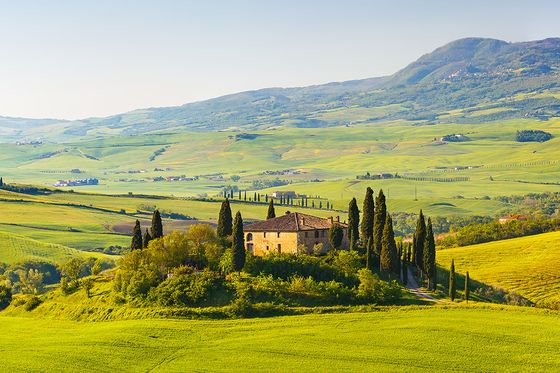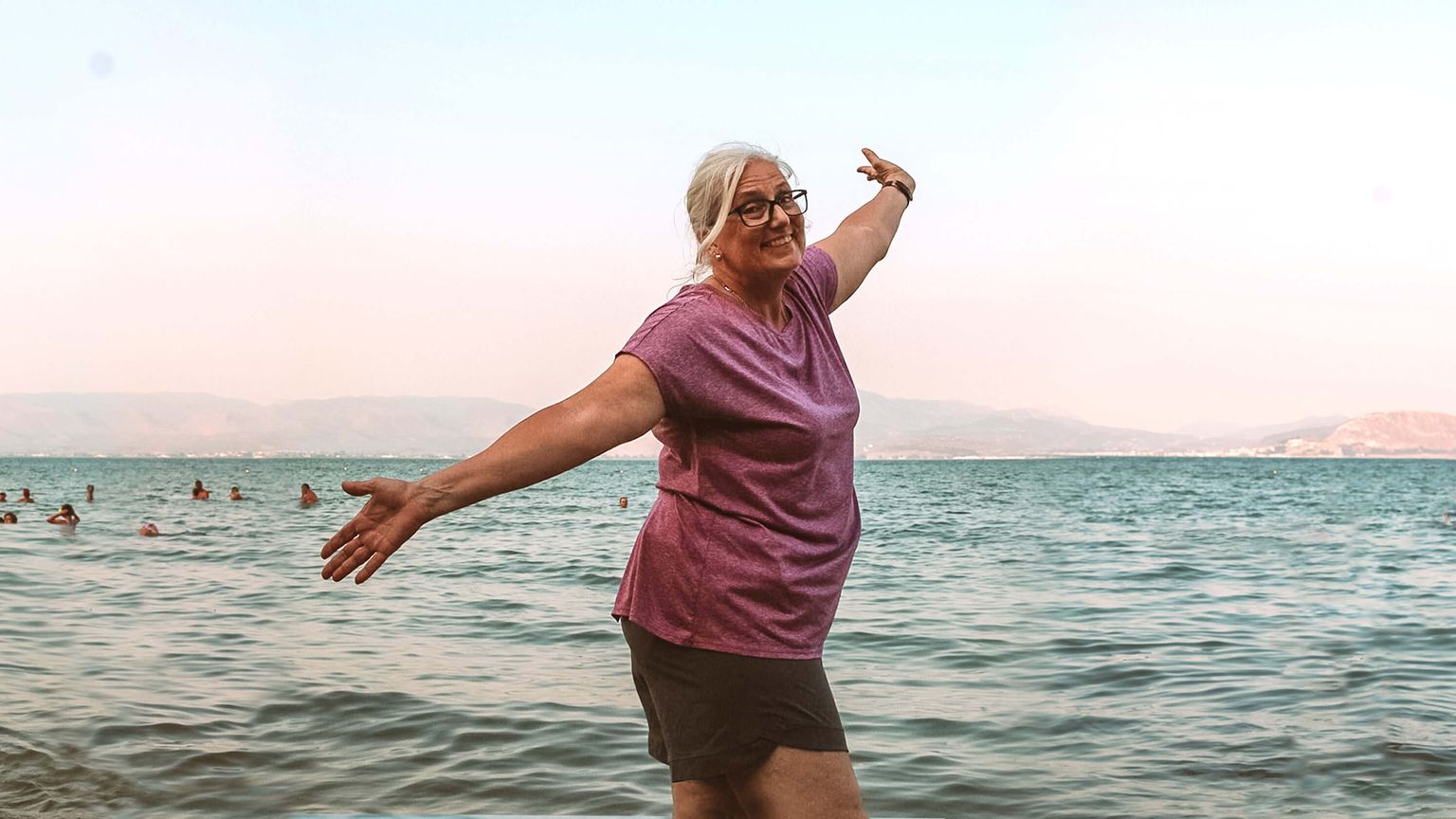
5 charming towns and villages in Tuscany to visit on tour
With their bustling streets, sprawling museums, and glamorous hotels and restaurants, Italy’s major cities are popular—and for good reason. But for travelers who hope to see the country’s quieter, more laid-back side, Tuscany is tough to beat. Its countryside is characterized by the gently rolling hills frequently featured in paintings and films. And in Tuscan villages, visitors will find no shortage of homemade food, top-notch wine, and fascinating history to enjoy. Here are some things to know if a trip to Tuscany’s best villages is in your travel plans.
What—and where—is Tuscany, Italy?
Situated in central Italy, its western edge stretching along the Tyrrhenian Sea, Tuscany—or Toscana, in Italian—is one of the 20 regions that make up Italy. It’s home to nearly 4 million inhabitants, who are known as Toscani, and shares land borders with the regions of Liguria (home to Cinque Terre), Emilia Romagna, Marche, Umbria, and Lazio (whose capital is Rome). Within Tuscany are 10 provinces, including the capital, Florence (that’s Firenze in local speak).
If you’re wondering: “Where is Tuscany in relation to other major Italian cities?” the region is roughly 185 miles south of Milan and 175 miles north of Rome. For travelers heading to this picture-perfect part of Italy by plane, international airports in Florence and Pisa are closest. For those who enjoy overland adventures, efficient railways and motorways make getting here from other parts of the country a breeze. If you like to travel by boat, you can do that, too. Ferries offer routes between the Tuscan port of Leghorn and destinations like Sardinia, Elba, Corsica, and Barcelona. Check out this Tuscany map for a clear picture of where this region is located.

What to expect
Everything from artworks to romantic movies (hello, Under the Tuscan Sun) celebrate Tuscany’s bucolic landscape—think gently rolling hills and dusty, winding lanes lined with tidy rows of cypress trees. But Tuscany is also home to dozens of postcard-worthy villages and towns where medieval architecture, family-owned restaurants and shops, lively piazzas, and plenty more treasures are waiting to be explored.
Less busy—and with less car traffic—than major Italian cities like Rome, Venice, and Milan, Tuscany’s villages are pedestrian-friendly, so pack your comfiest pair of sneakers for your trip. Check out our top five tips for exploring Tuscany on tour.
What to eat and drink in Tuscany, Italy
Tuscan food is often rustic, hearty, and made with lots of local produce. Specialties and signature dishes vary by province, but one food—bread—reigns supreme throughout the region. Of course, fresh pasta is a staple. But be sure to try other regional dishes, too, like veggie-forward soups and stews. Two Italian dishes that are worth the flight include a bean-and-kale soup called ribolita, and pappa al pomodoro, a flavorful, comforting soup that’s made with Italian tomatoes and olive oil and gets its distinctively mushy consistency when crusty bread is cooked in. (Ready for some impress-your-tour-mates trivia? In Italian, pappa means “mush,” and al pomodoro means “with tomatoes.”)
When it comes to drinks, Tuscany is synonymous with wine, and its famous, full-bodied reds are world-renowned. The region’s key local grape is the sangiovese, which is used to produce Chianti, Brunello di Montalcino, and Vino Nobile di Montepulciano wines. Also worth exploring: Super Tuscans, or Tuscan wines made with non-indigenous grapes. Dozens of wineries and vineyards in the region offer tours and tastings, and you’re sure to find plenty of Tuscan wines in local ristorantes and enotecas, too. Here are five Italian wineries to check off your bucket list.
Five of the best Tuscan villages to visit on tour

1. Lucca
Situated in northwestern Tuscany, the charming town of Lucca is known for the well-preserved defense walls that surround it. (For some of the best views in town, take a walk atop them.) It’s also known as the City of 100 Churches. A can’t-miss is the Duomo di San Martino. Its facade is famously askew, and it’s home to the tomb of Ilaria del Carretto—a noblewoman and the second wife of Paolo Guinigi, who was a lord of Lucca in the 15th century. You’ll visit Lucca on our Florence, Tuscany & the Italian Riviera tour and get to see Guinigi Tower, a fortified medieval tower that’s topped by a small grove of ancient oak trees. Use your free time to check out the town’s botanical gardens and the Piazza dell’Anfiteatro, a public square built on top of the ruins of a Roman amphitheater—they’re both wonderful ways to spend a day in Lucca.
Feeling hungry? Scope out some tordelli Lucchese (Lucca’s signature stuffed pasta), befanini cookies, or buccellato (a traditional sweet bread). Cigar aficionados will want to pick up another Lucchesi specialty—the Tuscan cigar—to enjoy while strolling around town.
Go here for: medieval architecture and traditional Lucchesi eats.

2. San Gimignano
San Gimignano is known as the Manhattan of the Middle Ages for the 13 soaring towers that stud its skyline. In its heyday, the town had as many as 65. Today, visitors to the UNESCO World Heritage Site come to marvel at the town’s plethora of medieval architecture and to get a taste of life in the 14th century.
You’ll have a free day to spend however you’d like in San Gimignano on our Food & Wine: Piedmont & Tuscany with America’s Test Kitchen tour. Highlights worthy of your itinerary include the town’s 12th-century cathedral, and the Palazzo Comunale. Active visitors can climb the Torre del Podestà—it’s also known as Torre Grossa, or “fat tower”—which was built in 1311 and is the tallest in town. Things take a dark turn at the Torture Museum, where instruments from the 16th, 17th, and 18th centuries are on display. Macabre, maybe. Fascinating, for sure.
When in Rome—er, make that Tuscany—do as the locals do and drink some wine. One of the best places for it: the Vernaccia di San Gimignano Wine Experience - La Rocca. There, guests can follow a multimedia trail to learn more about the wine, then settle in at a tasting table to sip some local standouts.
Go here for: a deep dive into history.

3. Montalcino
A hill town in the Val d’Orcia surrounded by fortified walls, Montalcino is renowned for its world-famous Brunello di Montalcino wine. Its crowning jewel is the Montalcino Fortress, which stands at the highest point of town and serves as a venue for special events, like the Jazz & Wine Festival that comes to town every summer. Visitors who climb to the top of its tower can reward themselves with a glass of red at the fortress’s enoteca, or wine bar.
You’ll get a day in this Tuscan town on our Food & Wine: Flavors of Tuscany & Umbria tour, with the entire morning to explore on your own. Don’t miss the Neoclassical Cathedral of San Salvatore, and the Piazza del Popolo, Montalcino’s main square, which is surrounded by cafes, bars, and restaurants. One of the best places in Montalcino to view art by Sienese masters is the Civic and Diocesan Museum of Sacred Art. It occupies a former convent and features works from the 14th and 15th centuries.
Of course, no visit to Montalcino would be complete without a stop at The Museum of the Community and Brunello di Montalcino to learn about the delicious wine’s earliest days.
Go here for: art and a world-renowned wine.

4. Pisa
Most tourists visit Pisa for its leaning marble tower, but if you’re on our Journey through Italy: Milan to the Amalfi Coast, you’ll see a lot more reasons to visit. This Tuscany city is home to an elite university, which means that bars, restaurants, and shops in the center of town are frequently chock-full of locals. Add to the mix Pisa’s Romanesque buildings, Gothic churches, and Renaissance piazzas, and the city is truly a must-see.
In the center of town, the recently restored Piazza Vittorio Emanuele II is a popular meeting place for locals. It’s also a good jumping-off point for a stroll along Corso Italia, the city’s main shopping thoroughfare. Feel up for some nightlife? Head to Piazza Garibaldi for a glass of grappa or a pint of Italian beer. The Arno River runs through Pisa, and the Ponte di Mezzo bridge is one of the best spots in town to snap some keepsake photos of it, as well as of the cafes, shops, and beautiful buildings that line its banks.
Go here for: river views, lively local life, and the iconic leaning tower.

5. Siena
Siena is one of the best places in Tuscany to marvel at medieval architecture. When you’re on our Undiscovered Tuscany: Lucca, Siena & Maremma tour, you’ll see highlights including the stunning, 13th-century Siena Cathedral, whose boldly striped marble tower and interior columns are nothing short of spectacular. And don’t miss the Palazzo Comunale, or Palazzo Pubblico, and its sky-high Torre del Mangia. Also worth a visit is the Piazza del Campo, a seashell-shaped medieval square and the city’s central hub (grab a seat at a cafe for an espresso and some primo people-watching). A visit to any of these marvels makes our list of ways to spend free time in Siena.
Strolling Siena’s hilly streets and narrow alleyways is bound to make you work up an appetite. When you’re ready to refuel, try one of the many sweets Siena is known for—ricciarelli, panforte, and cavallucci among them. For a more stick-to-your-ribs kind of meal, take a seat at a local trattoria and order a plate of pici—a thick, handmade, spaghetti-type pasta that’s often served with pecorino cheese and Cinta Senese sausage. Mangia!
Go here for: people-watching, architecture, and classic Sienese sweets.
Ready to visit the Tuscan village of your dreams? Book your Tuscany tour today.

































































































